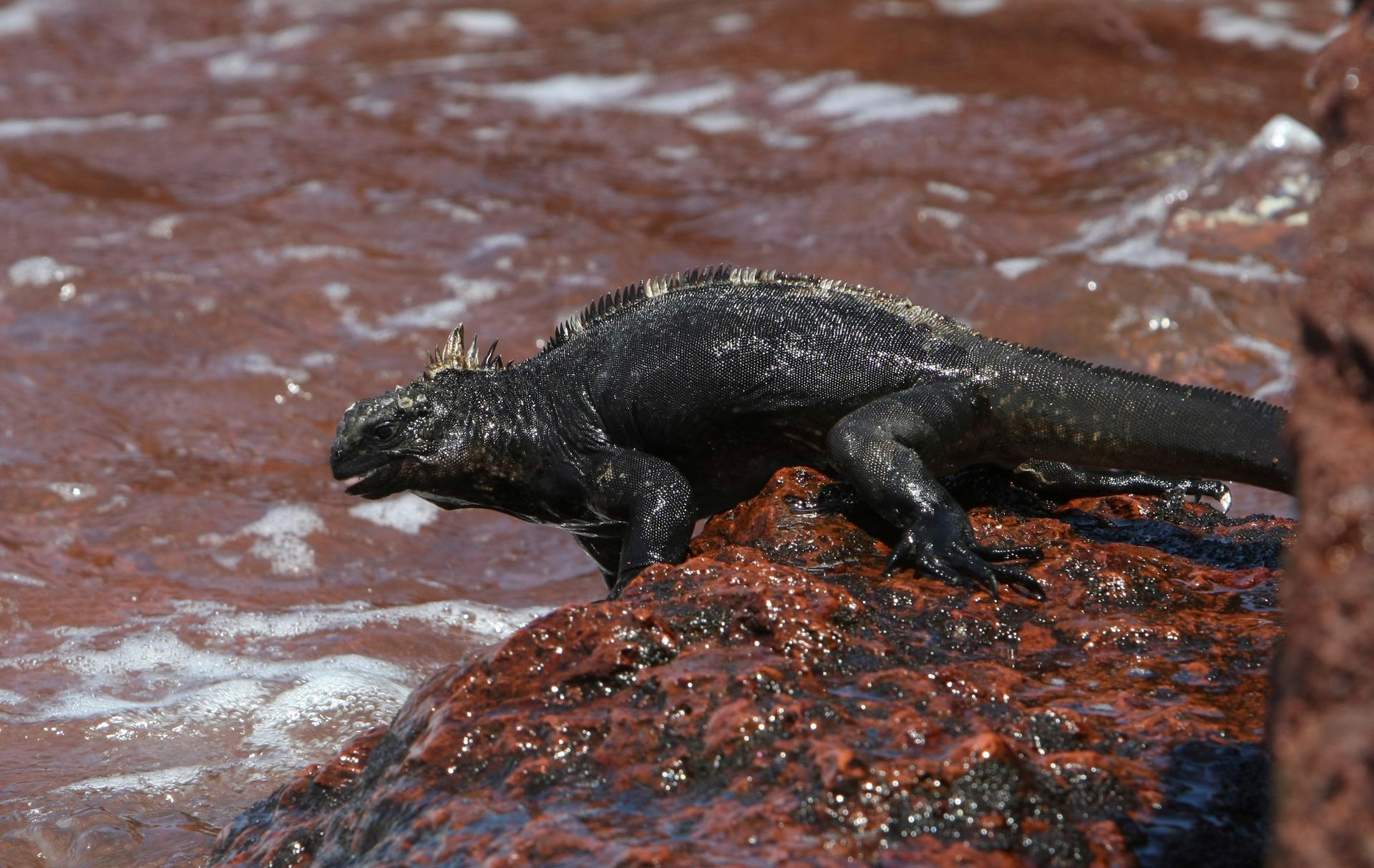Writer Jennifer Junghans had always dreamed of going to the Galapagos Islands to swim with the marine iguanas. In 2017, she finally had her chance.
Her beloved iguanas remained on shore, but the experience brought her up close with blue-footed boobies and blacktip sharks — and face-to-face with a curious pufferfish.
Here’s an excerpt from her audio diary about her experience:
For as long as I can remember, I’ve dreamed of traveling to the Galapagos Islands to free-dive with the ancient marine iguanas and roam the archipelago, as Darwin did as he unraveled our story of evolution.
He found little value in the marine iguana, insulting their physical appearance, intelligence and behavior. But I fell in love with them when I saw a photo in National Geographic of this wave of marine iguanas swimming underwater.
I longed to be right there among them, these gentle giants that often look like statues on land, armored in scales, with faces that resemble a gentler cousin of Tyrannosaurus rex and snaggletoothed spines that jut from head to tail, eyes that stare, and large claws at the end of hands that look strangely like our own.
Then, in 2017, I disembarked a small plane from Ecuador and stepped into the remote wilderness of my dreams.
In July, the temperature is cooler, the seas are rougher and the winds are stronger, but the lifecycles of the natural world are vigorous and alive. Here, the animals are abundant and unafraid.
Related: ‘Nature is always singing’: Now you can make your own music from nature’s sounds
In one startling panoramic view, blue-footed boobies dive like torpedoes into turquoise water; sea lion pups with giant, dark globes for eyes and sand all over their faces follow us as they wait for their mothers to return with food; and colossal numbers of my beloved marine iguanas bask in the sun to warm themselves, piled in tangles of arms and legs and salt-crusted faces.
At night when we anchor at sea, sea lions jump up to rest and sleep on the stern of our boat and we wait for blacktip sharks to appear just below the surface, likely looking to score an easy meal, accustomed to the bycatch fishing boats dump. I gasp when they appear. Several have come and we peer overboard, the mystery of how big the next one will be or how close it will come or from which direction, electrifies my senses.
Related: Scientists say nature therapies don’t just feel good — they save trillions in health costs
In their presence, Hollywood’s characterization of these beings as man-eating predators crumbles and I feel an undeniable resurrection of a connection once lost.
Out here in the wilderness, under the celestial skies, in these moments of reverence, I am closer to the truth than I’ve ever been.
Out here in the wilderness, under the celestial skies, in these moments of reverence, I am closer to the truth than I’ve ever been. I don’t wonder about the future or question my existence. Somehow, out here, where the planet pulses according to its natural rhythms, it all makes sense.
We take a long hike up rocky terrain to where blue-footed boobies have gathered to mate and raise their young. White puffs of down stretch their gaping beaks upward from beneath their mother’s wing and, by the magic of serendipity, we witness the flamboyant courtship dance and the rarely seen mating of these birds.
But it’s a tiny pufferfish that touches me most. Several swim up to me as I snorkel, but one stays. She fans her fins, hovering right in front of me, observing me as intently as I observe her. We stay like this, face-to-face, for several minutes.
I’ve never felt so acknowledged or seen.
In that moment, the boundary between species blurs. We are two beings who share this planet in a moment of uninterrupted recognition.
In that moment, the boundary between species blurs. We are two beings who share this planet in a moment of uninterrupted recognition. As different as we look, transcending millions of years of evolution, we come from the same origin — in fact, we share strikingly similar genomes with pufferfish — and something inside me innately knows it.
I never did swim with the marine iguanas, as I’ve dreamed of. They spent most of their time basking on land, even though they depend on the algae clinging to rocks in the sea. But my time here has given me something greater. Wandering among these wild animals at every turn, I attune to how life unfolds and exists when we are the visitor. It’s illuminated what the world once was and the wildness that we are still able to preserve and protect.
This audio essay aired on Living on Earth from PRX.
